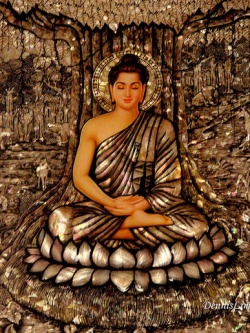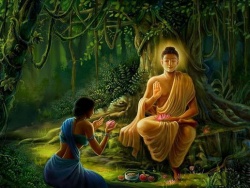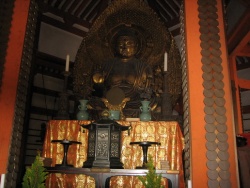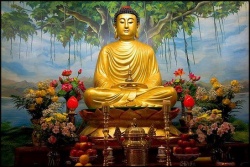Difference between revisions of "The story of Sumedha"
| Line 110: | Line 110: | ||
[[Category:Paduma]] | [[Category:Paduma]] | ||
[[Category:Narada]] | [[Category:Narada]] | ||
| − | + | ||
[[Category:Sumedha]] | [[Category:Sumedha]] | ||
[[Category:Sujata]] | [[Category:Sujata]] | ||
Revision as of 16:01, 2 June 2013
Four Asankheyyas and one hundred thousand aeons ago, in the city of Amaravati, there lived a very rich and learned man called Sumedha. After the death of his parent, his Treasurer showed him the colossal wealth he had inherited; also the names of his parents and forefathers who were the former owners whose names where written in the record books. The Treasurer replied that all were dead. He then asked why they did not take away their wealth with them. The treasurer told him that the world was such that after death no one could take anything away with them, but must leave all their wealth behind. On hearing this, Sumedha realized the wantonness of Samsara (the cycle of birth and death).
He then went to the king's palace and asked for permission to distribute his wealth. When he could not finish one warehouse full of gold and precious stones in seven days, he become inpatient and though that he might die at any moment, and he had not yet finished distributing his twelve thousand five hundred warehouse full of treasures. He forthwith took the keys of the warehouses to the middle of the city and signed away all his wealth. He freed his slaves, gave them immense wealth, and advised the people to renounce the world. He himself then entered the jungle and become a hermit.
Sakka the King of the Devas, ordered Vissa-kamma to build a temple for Sumedha and also to provide for the requirement of a hermit. That Deity built the temple and provided Sumedha with the necessary things. After seven days of deep meditation, he attained "Jhana" or divine ecstasy, i.e. Supernatural Powers, etc. At that time Dipankara Buddha was staying at Sudasana Monastery in Amaravati together with four hundred thousand Arahats. People of the neighboring city invited the Lord Buddha and his disciples to their city, where they prepared and built large halls to accommodate Lord Buddha and his disciples. The people built and leveled the road with flags and flowers. They also strewed white sand on the ground. All the workers were eager and happy.
Sumedha the hermit, because he was always in the state of "Jhana", i.e. ecstasy, did not know that Dipankara Buddha was staying in the city. One day as he was coming out of the jungle in search of food, he was surprised to see so many people working happily, leveling the roads. He flew down and enquired of the reason. They told him that they were preparing the roads for Lord Buddha and his disciples to enter the city, to receive their offering of food, etc. Sumedha thought to himself, "This word "Buddha" is very rare and we seldom hear it". So he asked them to allow him to help. The people knowing that he had supernatural powers, gave him a deep muddy valley to fill up.
He could use his supernatural powers, but he knew that he would get no merit for it. So instead of that, he worked very hard carrying basket of sand and trying to fill up the valley. Before that part of the road was complete, Dipankara Buddha and his disciples together with a great procession of followers arrived. Sumedha at once threw himself flat on the ground and asked the Buddha to step on his body in order to cross the muddy valley. By doing this meritorious deed, he knew that he could become an Arahat, but he gave up the idea and aspired to become a Buddha in the presence of the Supreme Buddha. The deities of the ten thousand worlds and other beings knowing that on that day Sumedha would be registered as a Bodhisatta, came down and mingled with human beings.
At that time the people could see the Deities, and heavenly music rank in harmony with earthly music. Dipankara Buddha announce to all the assembly of Deities and men that this Sumedha in the future would become a Buddha like himself. The Buddha then offered eight handfuls of jasmine flowers given by a Novice and the Arahats and Deities did likewise. Sumedha sat on the heap of flowers and meditated on what could be the Pre-requisites of Buddhahood. He then found out that they were : -Dana (Charity), Sila (Observance of precepts), Nekkhamma (Renunciation), Panna (Wisdom), Viriya (Energy), Khanti (Patience), Sacca (Truthfulness), Adhitthana (Determination), Metta (Loving Kindness), and Upekkha (Equanimity). When he realized this, the earth shook and everyone present shouted "Sadhu", "Sadhu",
After becoming Bodhisatta a man is free from : -
Blindness, i.e. he can never be totally blind.
Deafness, i.e. he is never deaf.
Madness, i.e. he never is insane.
Dumbness, i.e. he is never dumb.
Becoming a cripple, i.e. he will never be one who crawls by means of a chair or bench.
Birth in a barbarian country, i.e. he can never be a barbarian.
Birth in the womb of a slave-girl, i.e. he can never be born a slave.
Becoming an absolute wrong believer, i.e. he will never have wrong beliefs.
Become a person of the effeminate sex, i.e. he will always be a male.
Committing the five deathly crimes, i.e. he will never kill father or mother or any Arahats. He will never create dissention among the Order and he will never injure Lord Buddha.
Leprosy, i.e. he will never be a leper.
Birth as a creature smaller that a quail (Vattaka).
Birth as an animal bigger than an elephant.
Becoming petas, i.e. he will never born as fire-consuming petas, etc.
Avici Hell and Lokantarika Hell, i.e. he will never be born in such a kind of hell.
Birth in the Celestial world, i.e. he will never be born in the Celestial world
Becoming Mara.
Birth in other world, i.e. he will never be born in other worlds.
After Dipankara Buddha, there was no Buddha for one Asankheyya. Then came Kondanna Buddha. During this period, Sumedha the Bohdisat, who was born as a world monarch called Vijitavi, did many meritorious deeds and on Wesak Full Moon Day, aspired to become a Buddha.
At the time of Mangala Buddha, the Bodhisatta was born as a Brahmin called Surici. He renounced the world and aspired to be a Buddha.
During Sumana Buddha's era, he become Atula the Dragon King. He also aspired to become a Buddha.
At the time of Revata Buddha, he was born as the Brahmin Atideva. He also aspired to become a Buddha.
When Sobhita Buddha was in the world, the Bodhisatta was born as the Brahmin Sujata. He also aspired to be a Buddha.
During Anoma-dassi Buddha's period, the Bodhisatta, become a great Devil-King called Yakkha. He also aspired to be a Buddha.
At the time of Paduma Buddha, the Bodhisatta who was born as a lion, also aspired to be a Buddha.
During Narada Buddha's time, the Bodhisatta became a hermit, attained divine ecstasy and aspired to be a Buddha.
When Padumuttara Buddha was on earth, the Bodhisatta was born as a great man called Jatila. He also made aspirations for Buddhahood.
During Sumedha Buddha's time, the Bodhisatta was born as a man called Uttara. H also aspired to become a Buddha.
At the time of Sujata Buddha, he became a world monarch also made aspiration to become a Buddha.
In Piya-dassi Buddha's time, the Bodhisatta was born in a Brahmin family called Kassapa. He also aspired to be a Buddha.
During Atta-dassi Buddha's period, the Bodhisatta became a powerful hermit called Susima. He also aspired to be a Buddha.
In Dhamma-dassi Buddha's time, the Bodhisatta who became Sakka Deva Raja, i.e. King of Gods, also aspired to be a Buddha.
When Siddhartha Buddha was in the world, the Bodhisatta became Mangala the hermit. He also made aspiration for Buddhahood.
During the time of Tissa Buddha, the Bodhisatta became King Sujata. He renounced the world, studied the Doctrine, and made aspirations to become a Buddha.
At the time of Phussa Buddha, the Bodhisatta was born as the King Vijitavi. He renounced the world, studied the Doctrine and made aspiration for Buddhahood.
During Vipassi Buddha's time, the Bodhisatta was born as a Dragon King. He also aspired to be a Buddha.
In Sikhi Buddha's time, the Bodhisatta was born as King Arindama. He also made aspirations to become a Buddha.
During the period of Buddha Vessabhu, the Bodhisatta who became King Sudassana also made aspirations for Buddhahood.
At the time of Kaku-sandha Buddha, the Bodhisatta was born as King Khema. He renounced the world and aspired to become a Buddha.
During the era of Konagamana Buddha, the Bodhisatta became King Pabbata. He offered Chinese silk robes, carpets, etc. He also aspired to become a Buddha.
When Kassapa Buddha was on earth, the Bodhisatta was born as a man called Jotipala. He renounced the world and made aspirations to become a Buddha.
During this long period, the Bodhisatta had been practicing the Ten Paramitas or Pre-requisites of Buddhahood, which are as follows : -





